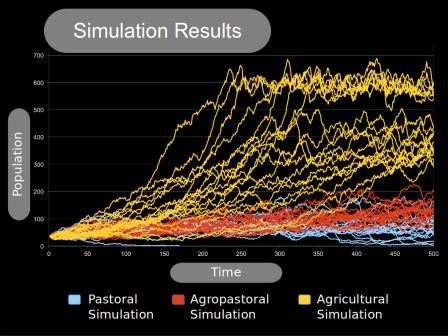Isaac Ullah. Visiting Scholar in the Center for Comparative Archaeology, University of Pittsburgh.
"Simulating the consequences of early farming strategies: a computational modeling approach to understanding long-term socio-ecological dynamics in low-level agropastoral systems."
Archaeologists have done a truly remarkable job recovering and piecing together a myriad of fragments of data about early agricultural societies around the world. As a result, archaeologists have been able to construct reasonably precise qualitative models of the kinds of activities these people were engaged in, what they ate, how they constructed their houses, and how these societies grew, succeeded, or failed. The archaeological record is at best fragmentary, however, and so most of the details about life in the earliest farming societies are missing. Moreover, the socio-ecological dynamics of these ancient societies are never preserved. Thus, while we have some understanding of the end-result of a palimpsest of human activities in different early farming societies, there remains little consensus about the underlying processes that led to these consequences. This is apparent in current debates about sustainability and societal “collapse”. I contend that if we are to make headway on big questions such as “Why do some societies succeed and others fail?”, we must first answer a set of smaller questions related to these missing dynamics. To do so, we need to draw on theory that is appropriate to understanding dynamics, and use a modeling framework that operationalizes that theory in a practical sense. In this paper, I use agent-based computer simulation of small-scale agropastoralism – rooted in complexity theory – to conduct a set of modeling experiments aimed at better understanding the dynamics of land-use decision-making in ancient farming societies. Using the case study of the “collapse” of Pre-Pottery Neolithic B cultures (PPNB, ~10500-8500 ybp) in the Southern Levant, I try to answer the “smaller” question of how local, short-term decisions can lead to large-scale unexpected consequences over the long term. I pay particular attention to the everyday decisions of farming and stock-raising, and investigate how the small consequences of these decisions could have accrued over the 700 years of the PPNB period. The analysis touches on issues of path dependency, tipping points, resilience, sustainability, and vulnerability, and the results suggest that the computational modeling approach holds great promise for the future of comparative archaeological approach to large-scale social research.

Location and Address
3106 WWPH Anthropology Lounge